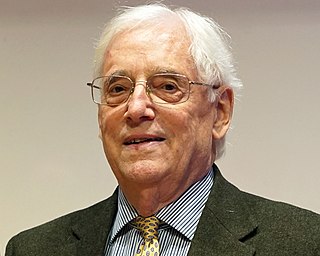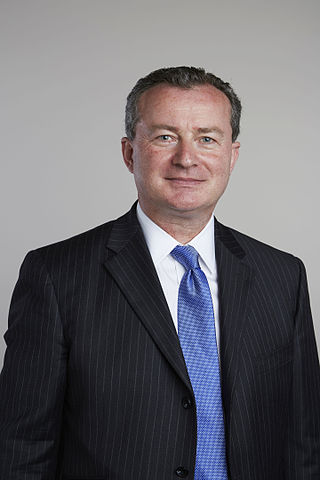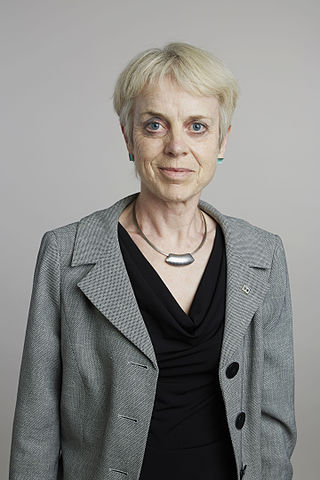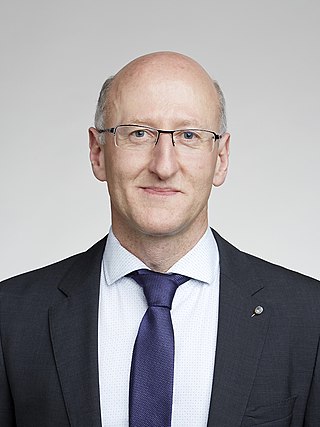
Apert syndrome is a form of acrocephalosyndactyly, a congenital disorder characterized by malformations of the skull, face, hands and feet. It is classified as a branchial arch syndrome, affecting the first branchial arch, the precursor of the maxilla and mandible. Disturbances in the development of the branchial arches in fetal development create lasting and widespread effects.

Sir John Ernest Walker is a British chemist who won the Nobel Prize in Chemistry in 1997. As of 2015 Walker is Emeritus Director and Professor at the MRC Mitochondrial Biology Unit in Cambridge, and a Fellow of Sidney Sussex College, Cambridge.
Sir John Anthony Hardy is a human geneticist and molecular biologist at the Reta Lila Weston Institute of Neurological Studies at University College London with research interests in neurological diseases.
Dame Jean Olwen Thomas, is a Welsh biochemist, former Master of St Catharine's College, Cambridge, and Chancellor of Swansea University.
Mariann Bienz, Lady Pelham is a Swiss-British molecular biologist based at the UK Medical Research Council Laboratory of Molecular Biology. She has been a member of their Senior Scientific Staff since 1991, was Joint-head of Cell Biology in 2007-08 and has been a Group Leader of Protein and Nucleic Acid Chemistry Division since 2008.

Tomas Robert Lindahl is a Swedish-British scientist specialising in cancer research. In 2015, he was awarded the Nobel Prize in Chemistry jointly with American chemist Paul L. Modrich and Turkish chemist Aziz Sancar for mechanistic studies of DNA repair.

Gilean Alistair Tristram McVean is a professor of statistical genetics at the University of Oxford, fellow of Linacre College, Oxford and co-founder and director of Genomics plc. He also co-chaired the 1000 Genomes Project analysis group.

Laurence Daniel Hurst is a Professor of Evolutionary Genetics in the Department of Biology and Biochemistry at the University of Bath and the director of the Milner Centre for Evolution.

Sir James Cuthbert Smith is an Emeritus Scientist at the Francis Crick Institute, Honorary Fellow of Christ's College, Cambridge and President of the Council at the Zoological Society of London.

Annette Catherine Dolphin is a British scientist who is Professor of Pharmacology in the Department of Neuroscience, Physiology and Pharmacology at University College London (UCL).

Steve David Macleod Brown is a British geneticist who is director of the Medical Research Council (MRC) Mammalian Genetics Unit, MRC Harwell at Harwell Science and Innovation Campus, Oxfordshire, a research centre on mouse genetics. In addition, he leads the Genetics and Pathobiology of Deafness research group.

Jonathon Noë Joseph Pines is Head of the Cancer Biology Division at the Institute of Cancer Research in London. He was formerly a senior group leader at the Gurdon Institute at the University of Cambridge.

Edith Yvonne Jones is a British molecular biologist who is director of the Cancer Research UK Receptor Structure Research Group at the University of Oxford and a Fellow of Jesus College, Oxford. She is widely known for her research on the molecular biology of cell surface receptors and signalling complexes.

Anne Carla Ferguson-Smith is a mammalian developmental geneticist. She is the Arthur Balfour Professor of Genetics and Pro-Vice Chancellor for Research and International Partnerships at the University of Cambridge. Formerly head of the Department of Genetics at the University of Cambridge, she is a Fellow of Darwin College, Cambridge and serves as President of the Genetics Society.

Anne Jacqueline Ridley is a British biologist who is professor of Cell Biology and Head of School for Cellular and Molecular Medicine at the University of Bristol. She was previously a professor at King's College London.

Richard Malcolm Marais a British researcher who is Director of the Cancer Research UK (CRUK) Manchester Institute and Professor of Molecular Oncology at the University of Manchester.

Sir Richard Henry Treisman is a British scientist specialising in the molecular biology of cancer. Treisman is a director of research at the Francis Crick Institute in London.
Matthew Edward Hurles is director of the Wellcome Sanger Institute and an honorary professor of Human Genetics and Genomics at the University of Cambridge.
Caetano Maria Pacheco Pais dos Reis e Sousa is a Portuguese scientist who is a senior group leader at the Francis Crick Institute and a professor of Immunology at Imperial College London.
Anne Goriely is a Belgian geneticist who is a professor of human genetics at the University of Oxford. Her research investigates the molecular mechanisms that underpin genetic variation, particularly mutations in the male germline.













